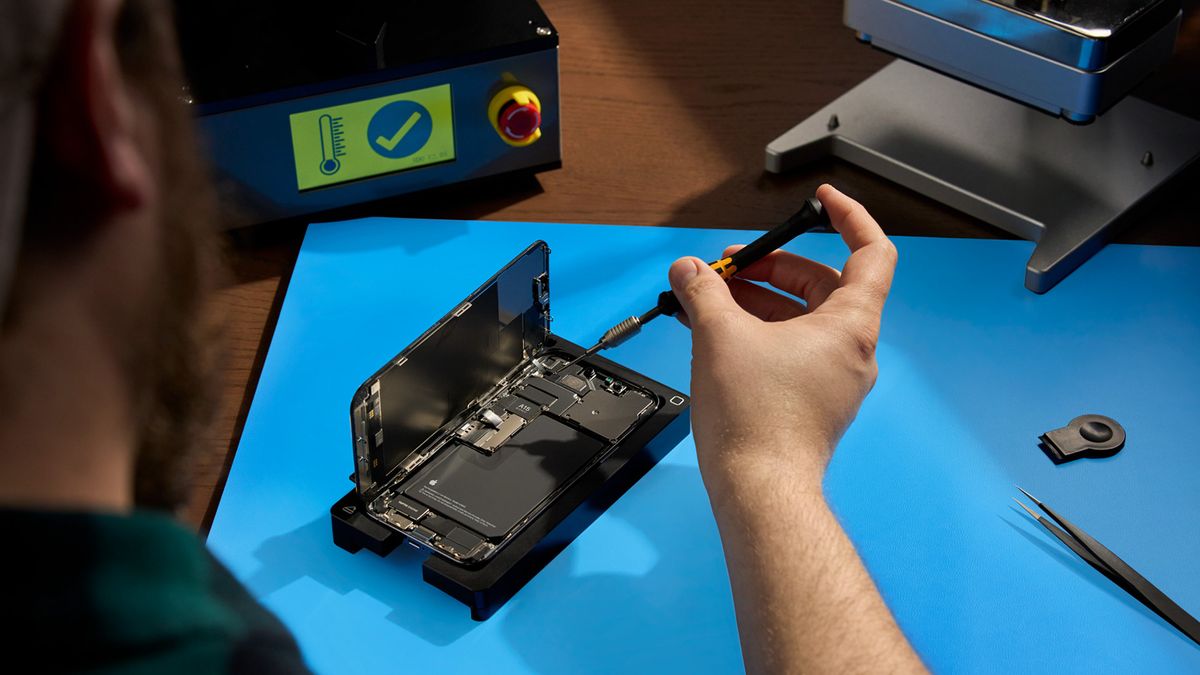At a recent White House event, Apple confirmed it will officially back a federal right-to-repair bill in the United States as well as provide resources to independent shops and consumers to fix their products.
This support comes alongside President Joe Biden’s push to establish “regional tech hubs” across the country to spur competition among companies and create new jobs. Brian Naumann, Apple’s vice president for service and operations, stated the brand “believes [everyone] would benefit from a national law that balanced repairability with product integrity, usability, and physical safety.” Until federal legislation is made, the company will “honor California’s new repair provisions across the United States”. It will offer documentation like manuals, tools, plus parts to people who want them at “reasonable prices.” This move would also keep unnecessary waste out of landfills, according to National Economic Council Director Lael Brainard.
Naumann goes on to give some suggestions on what a national repair law could look like. A good bill would “maintain… security features… to thwart theft, ensure transparency for consumers about the type of parts used in a repair, and create a strong [single] standard”. Other states have their own right-to-repair laws with more potentially on the way. Having a universal set of rules would stop any confusion over conflicting laws.
Shifting attitudes
Apple’s right to repair support may come as a shock to some. The tech giant has famously been against giving people the ability to fix their devices, claiming the restrictions are “needed for safety or security reasons”. However, as FTC chair Lina Khan has pointed out, “these claims are backed by limited evidence.”
If you’ve paid attention to recent news, Apple did support California’s bill back in August, indicating shifting attitudes at the company. Under California’s rules, device manufacturers will need to offer materials for hardware within a certain timeframe. Products costing $50 to $99.99 will get three years of support. Anything above $100, like iPhones, gets seven years.
Now you may be wondering: is that really it? Is Apple totally on board with right-to-repair without any strings attached? Well, not exactly. As the old saying goes, the devil is in the details.
Playing by their rules
There are a couple of reasons why Apple is specifically adhering to the California law when offering its nationwide support and not from New York or Minnesota. First, the legislation only covers electronics made and sold after July 1st, 2021. Owners of older devices are out of luck. Secondly, it doesn’t stop parts pairing.
As explained in a Fast Company report, parts pairing is where components are tied to the device “that they’re shipped with”. If the parts aren’t properly linked, software features will not work. This is a practice that Fast Company claims Apple actively engages in. The report says if you want the components, you’ll have to play by Apple’s rules which may result in coughing up personal information or “agreeing to years of audits” if you’re an independent technician. It’s gotten to the point where third-party repair shops are outright leaving the industry. It’s just not worth the hassle.
The question is, will Apple lobby for parts pairing in a national right-to-repair law? We don’t know, but we wouldn’t be surprised if it did. The tech giant probably isn’t giving people free rein without a bunch of strings attached.
While we have you, be sure to check out TechRadar’s list of the best iPhone for 2023.





